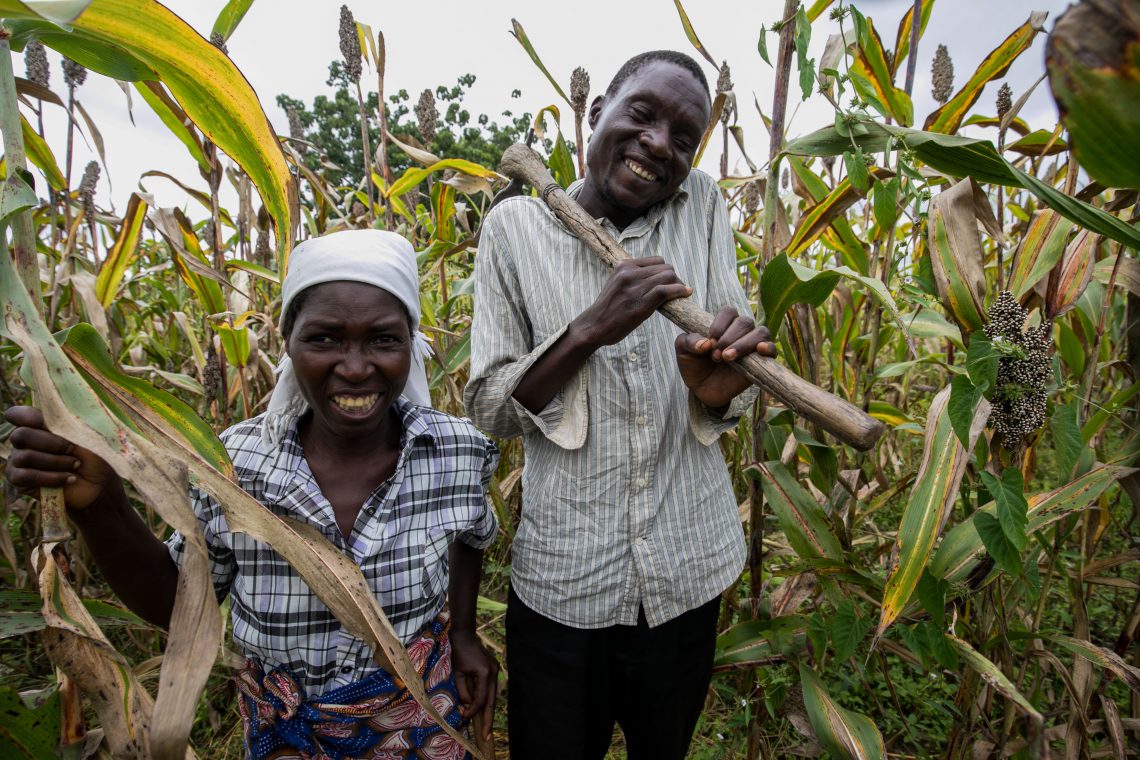By Tatenda Macheka (WFP)
Support and training for smallholder farmers in Zimbabwe helps one man see new opportunities in his field
Yamurayi Choruwa, 43, was born partially blind.
A name given by his parents when they realised his condition,“Yamurayi,” loosely translated from the local dialect, means “a call for help,” and he admits that for many years he spent sleepless nights crying and worrying about himself.
According to the Zimbabwe Council for the Blind, it is estimated that 125,000 people in Zimbabwe are blind and twice that number are visually impaired. These people often face social discrimination, as well as challenges in access to education and work.
“You are so lucky that you are not blind — today is a beautiful day and I cannot see it.” said Yamurayi, as he laughed off his own comment and continued, “To be blind is not miserable, but not to be able to bear blindness is miserable; and this is why I choose to be a farmer.”
With training he received from World Food Programme (WFP), the choice to become a farmer became a skill for life for Yamurayi.
Laying fertile groundwork for successful farming
“To wake up and go to the fields every morning makes me see the world, it makes me feel the happiness of my family and gives me the eyes to see the same beautiful day you are seeing today,” Yamurayi said.
In Zimbabwe, WFP has provided training through the Ministry of Agriculture, Mechanisation and Irrigation Development’s Department of Agricultural Technical and Extension Services (AGRITEX) to 9,900 smallholder farmers in four drought-prone districts (Mudzi, Rushinga, Uzumba Maramba Pfungwe and Mount Darwin). The demonstrative training packs were procured with the technical expertise from Food and Agriculture Organization (FAO).
“WFP taught us that climate is changing and we should also change the way we do farming; we were taught how to conserve moisture and also how to avoid soil erosion.” said Yamurayi, whilst lifting his head to the sun.
Farmers were trained on best practices and good crop production methods for low-rainfall areas, such as soil and moisture conservation practices and crop variety selection, as well as post-harvest management to reduce grain losses. Each farmer was provided with a demonstrative training pack comprised of sorghum seed and cowpeas — small grains that are more resilient in the changing climate — and fertilizer. A total of 22 mt of sorghum and 11 mt of cowpeas seed were provided between 2017 and 2018.
“I use my sense of touch to do my weeding. I touch around the plants and I can feel the difference between weeds and crops,” Yamurayi said. To look at his sorghum field is to recognize the impact of his training. “I have noticed that my sense of touch is quiet good, that if I touch something today I won’t forget it, and I can tell that this is the same thing that I touched some time ago.” Although Yamurayi admitted that that he often relies on his wife for assistance with more complicated tasks.
This year, Yamurayi is expecting to have a surplus of more than ten bags of sorghum, some of which he hopes to sell.
Besides the training on agricultural practices, the smallholder farmers also received training on farming as a business, emphasizing on market linkages and group development. During the previous 2016–17 season, WFP-supported farmers managed to harvest an average of 750 kgs (50kg/bag) of sorghum. A total of 212 mt of surplus was purchased by WFP under the Purchase for Progress (P4P) initiative, through support from the United States Agency for International Development (USAID), and routed as food assistance to other drought-affected districts under the Lean Season Assistance programme. Some farmers also sold their produce to the government’s Grain Marketing Board
A vision for a resilient future
A father of four, Yamurayi said that the only thing worse than being blind, is having sight but no vision. But “to wake up and go to the fields every morning makes me see the world, it makes me feel the happiness of my family and gives me the eyes to see the same beautiful day you are seeing today,” he said. With continued support, he hopes to be able to build a future for his family.
The training on climate- tolerant small grains and best adaptive weather shock practices provided by WFP is strengthening the ability of smallholder farmers in Zimbabwe to withstand shocks and improve their household food security. WFP- supported distribution of surplus food in vulnerable food insecure districts during the lean season further ensures the sustainability of the activity, moving the needle to ensure that no one is being left behind in achieving Zero Hunger.
For Yamurayi, he swears that he will be the one providing assistance to others, rather than receiving it. He saw a breakthrough in his training: “You have seen it for yourself, I have a disability, I cannot see, but I know an opportunity when I see one, and as long as I breathe, my family will never go to bed on an empty stomach.”






